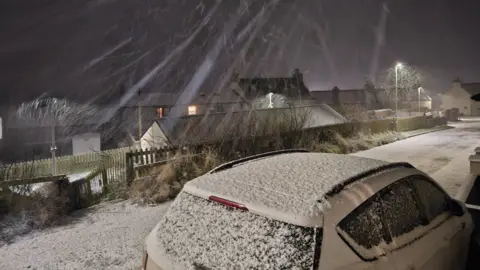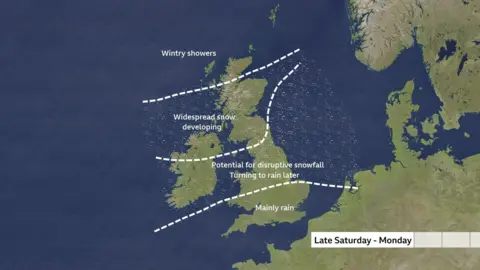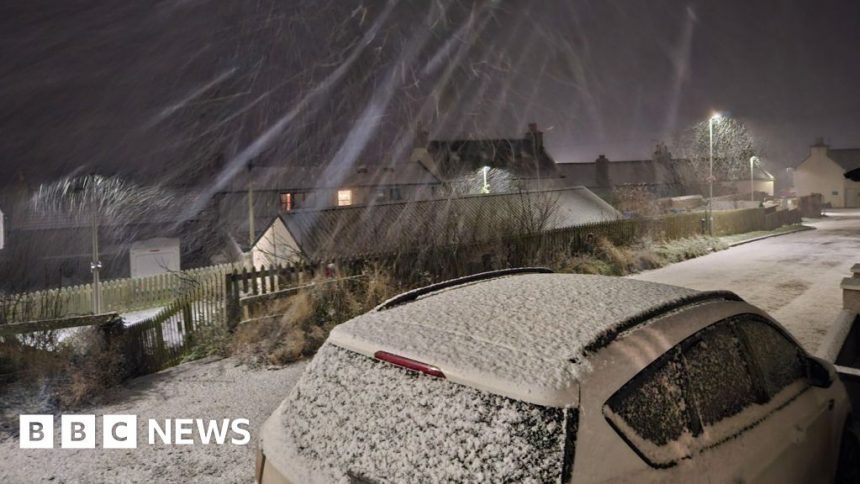Temperatures fall to -7.9C with snow warnings for weekend
 olly79/BBC Weather Watchers
olly79/BBC Weather WatchersTemperatures fell to nearly -8C overnight as an Arctic blast hits the UK, with warnings that snow could bring “significant disruption” this weekend.
Amber cold weather health alerts warning of a risk of a rise in deaths are in place for the whole of England, with one local NHS service urging people to avoid going out early in the morning when the frost is thick.
Yellow weather warnings for snow and ice are in place for most of England, Wales and Scotland between Saturday and Monday.
Health Secretary Wes Streeting told BBC Breakfast “it is definitely a weekend to turn the heating on”, after charity Age UK said the weather would bring the winter fuel payment cuts “into sharp relief”.
Benson in Oxfordshire recorded the UK’s lowest temperature of -7.9C overnight, with much of the UK seeing cold and frosty conditions on Friday morning.
Elsewhere, temperatures dropped to -7.5C in Shap, Cumbria, and -6.4C in Eskdalemuir, Dumfries and Galloway, earlier on Thursday night.
In Wales, the lowest temperature was -4.9C in Usk, while in Northern Ireland, it was -5.7C in Katesbridge.
Yellow Met Office warnings for ice are in force until 10:00 GMT on Friday in west Wales, north-west England and parts of Scotland and Northern Ireland, with wintry showers at times throughout the day.
Snow showers will continue in north-east Scotland bringing accumulations of up to 10cm over high ground during Friday too.
BBC weather presenter Sarah Keith-Lucas said 20-40cm of snow could fall across northern England and southern Scotland from late Saturday into Monday, which could cause “significant disruption”.
She said temperatures in towns and cities across the UK were expected to fall below freezing overnight on Friday into Saturday morning, with “significantly colder” conditions in rural areas. There could be some freezing fog patches in the Midlands and East Anglia, she added.
On Saturday evening, snow is forecast in parts of southern England, Wales, the Midlands in England and Northern Ireland.
On Sunday morning, snow is expected in parts of northern England, Northern Ireland and southern Scotland especially over higher ground where the snow is expected to be quite disruptive.
Later on Sunday, temperatures are expected to be milder in parts of the country, reaching 13C in London in contrast to Aberdeen where it could be just 2C.

The weather warnings include:
- A yellow warning for snow and ice in north-east Scotland, including the Orkney and Shetland Islands, until 10:00 GMT on Friday
- A yellow warning for ice is in place across north-west England, western Scotland and part of Northern Ireland until 10:00 on Friday
- Western Wales is also covered by a yellow ice warning until 10:00 on Friday.
- On Saturday from noon until midnight, a yellow warning for snow and ice is in place covering all of England apart from the south-west, and the whole of Wales
- A separate yellow warning for snow covers most of Scotland, except the far north, from midnight on Sunday until 12:00 GMT on Monday
The amber cold health alerts cover the whole of England but are not in place for the rest of the UK.
The UK Health Security Agency (UKHSA) issues the alerts when temperatures are likely to affect people’s wellbeing, in particular those who are elderly or have health conditions.
The alerts provide early warning to healthcare providers, and suggest actions such as actively monitoring individuals at high risk, and checking that people most vulnerable to cold-related illnesses have visitor or phone call arrangements in place.
Local NHS services have been issuing tips to residents, with NHS Black Country’s integrated care board telling people to “avoid going out early when the frost is thick or late at night when it’s dark”.
Age UK’s director Caroline Abrahams said on Thursday that the cold weather would bring the government’s decision to limit winter fuel payments “into sharp relief”, and added the charity had already been contacted by people “worrying about what to do”.
She urged older people “to do everything they can to stay warm” including risking spending more on their heating. Ms Abrahams added energy companies had “an obligation to help” those struggling and there may be support from local councils too.
The prime minister previously said it was important to protect pensioners who most needed the allowance, but many did not need it because they were “relatively wealthy”. The cut aims to save £1.5bn a year.
The Department for Work and Pensions (DWP) said on Thursday that no fresh postcodes had been triggered for cold weather payments.
Payments of £25 are made to eligible households when an area’s average temperature has been recorded as, or is forecast to be, 0C or below for seven consecutive days.
You can keep up to date with BBC Weather forecasts online and on the app.








